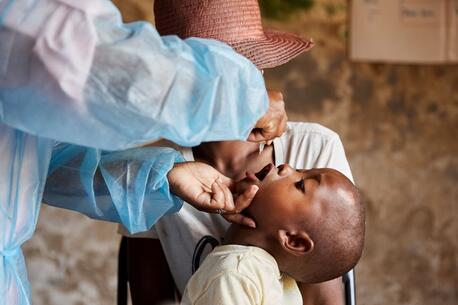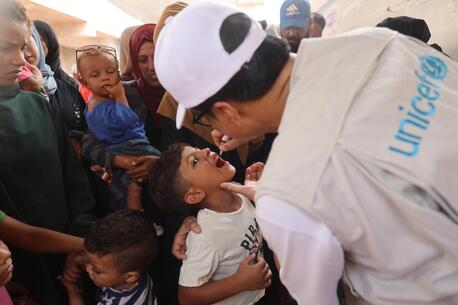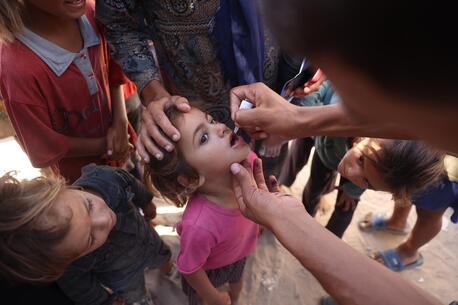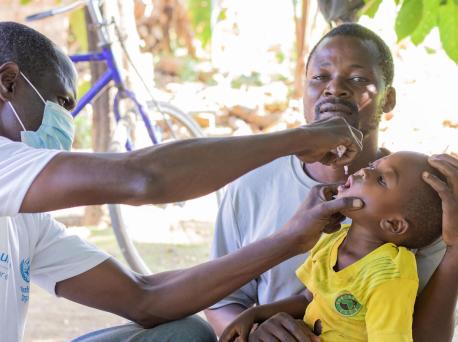
UNICEF and Rotary Double Down in the Fight Against Polio
Despite recent setbacks, UNICEF and partners are determined to finish the job of eradicating polio.
Unvaccinated children under 5 are most at risk
Polio, a highly contagious and sometimes deadly virus that can cause paralysis, was nearly eradicated in recent decades. Country after country was crossed off the list until the wild poliovirus remained endemic only in Afghanistan and Pakistan.
But a steep decline in childhood immunization rates since the start of the COVID-19 pandemic, the challenge of reaching the growing number of children affected by conflict and displacement, and vaccine misinformation have led to new polio cases reported in places that have been polio-free for years, if not decades.

Unvaccinated children, particularly those under age 5, are most at risk. There is no cure, and only one form of prevention: the polio vaccine.
Vaccinated children are protected for life. But to eliminate polio, every child in every household must be vaccinated.
As long as polio is a threat anywhere, it is a threat everywhere.
The global public-private partnership to end polio
In 1985, Rotary International launched a global effort to immunize the world's children against polio, followed by the establishment of the Global Polio Eradication Initiative (GPEI) in 1988. A public-private partnership led by national governments and supported by six core partners — UNICEF, the World Health Organization (WHO), Rotary International, the U.S. Centers for Disease Control and Prevention (CDC), the Bill & Melinda Gates Foundation and Gavi, the Vaccine Alliance — GPEI was born out of the world's commitment to reach every child in every country with the polio vaccine.
This year, with the goal of ending polio everywhere still within reach, UNICEF, Rotary and other GPEI partners are stepping up efforts to vaccinate every child.
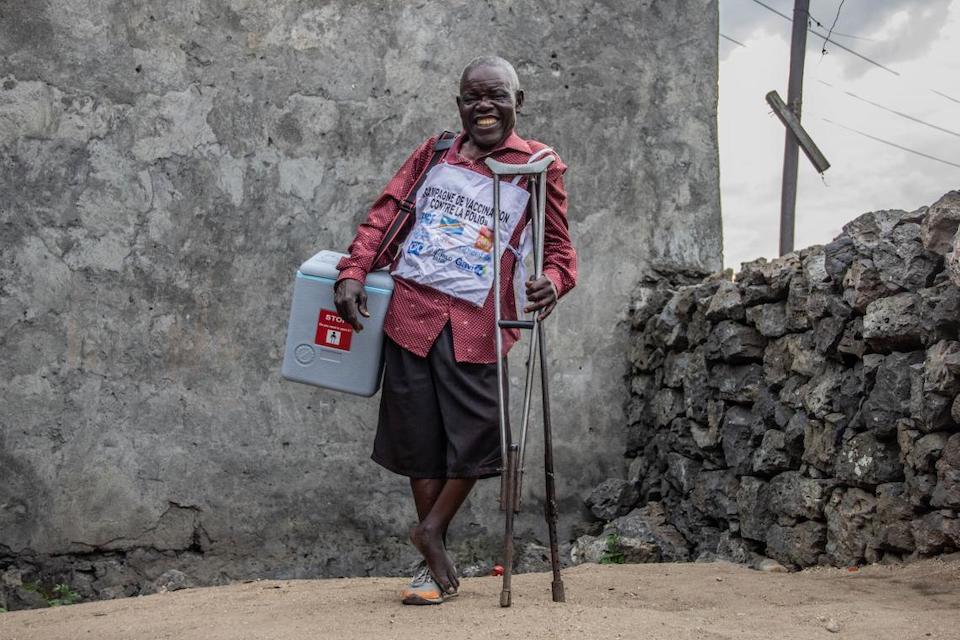
Crucial to those efforts are the individuals who go door-to-door, bringing polio vaccines to children who might otherwise be missed. These individuals, many of them community health workers, also provide sometimes reluctant parents with critical information on the safety and efficacy of vaccines.
Community health workers like Aissatou Moussa in Niger are trained to answer parents' questions and assuage their fears.
"Many people do not understand the dangers of polio, and we must sensitize them," Moussa says. "Many ask why we would give away the vaccine for free, if it is such a good thing."
Community mobilizers combat vaccine hesitancy
At each home, Moussa follows the same protocol. "First, we greet everyone, enquiring after their and their children's health. The elders give us chairs to sit on, while we explain how the vaccination process works. If parents agree, the vaccination team will drop by to vaccinate the household's children under 5."
Najaatu Musa leads a house-to-house vaccination team in Minna, Niger State, northern Nigeria. "I became a volunteer community mobilizer because I saw the need to help women in our community and their children," Musa says. "I teach them the importance of ante-natal care and routine immunization, so that when they give birth, they'll know when to take the child for vaccination."

In 2020, Nigeria was officially certified wild poliovirus-free, the last country in Africa to achieve that status. The milestone victory wouldn't have been possible without the dedicated efforts of thousands of health workers, volunteer vaccinators, traditional and religious leaders, parents and country leaders, who all share a commitment to a common goal: protecting every child from polio.
This year, despite setbacks, the global fight to eradicate polio continues. At a pledging moment on Oct. 18 at the World Health Summit in Berlin, world leaders confirmed support for global efforts to overcome the final hurdles to polio eradication, vaccinate 370 million children annually and continue disease surveillance across 50 countries.
"Children deserve to live in a polio-free world," UNICEF Executive Director Catherine Russell said after global leaders at the Summit pledged $2.6 billion to end polio. "But as we have seen this year with painful clarity, until we reach every community and vaccinate every child, the threat of polio will persist."
HOW TO HELP
There are many ways to make a difference
War, famine, poverty, natural disasters — threats to the world's children keep coming. But UNICEF won't stop working to keep children healthy and safe.
UNICEF works in over 190 countries and territories — more places than any other children's organization. UNICEF has the world's largest humanitarian warehouse and, when disaster strikes, can get supplies almost anywhere within 72 hours. Constantly innovating, always advocating for a better world for children, UNICEF works to ensure that every child can grow up healthy, educated, protected and respected.
Would you like to help give all children the opportunity to reach their full potential? There are many ways to get involved.



